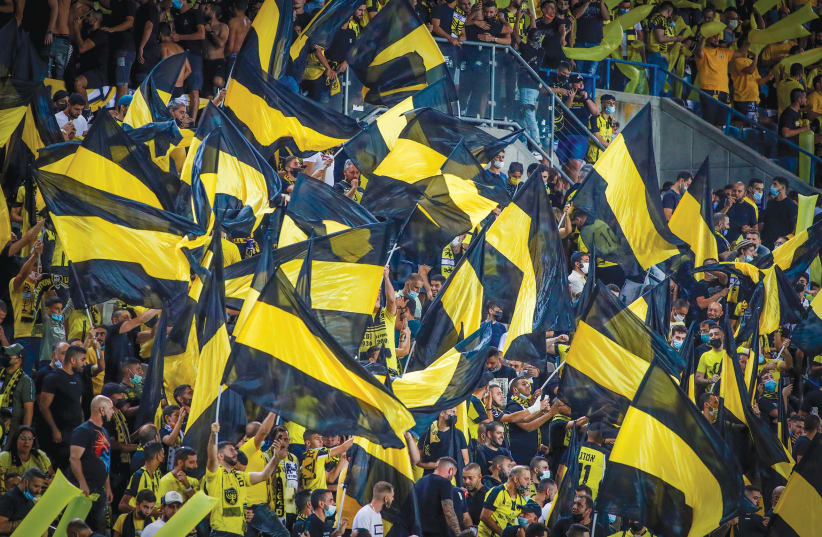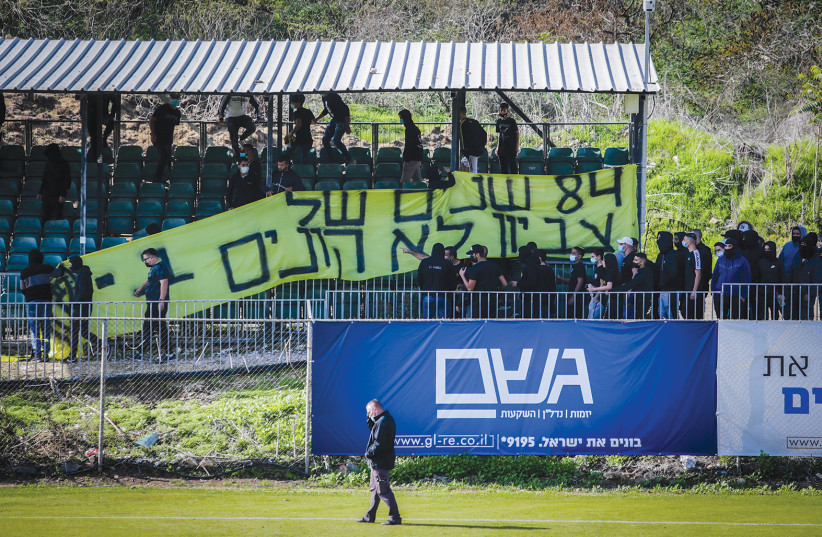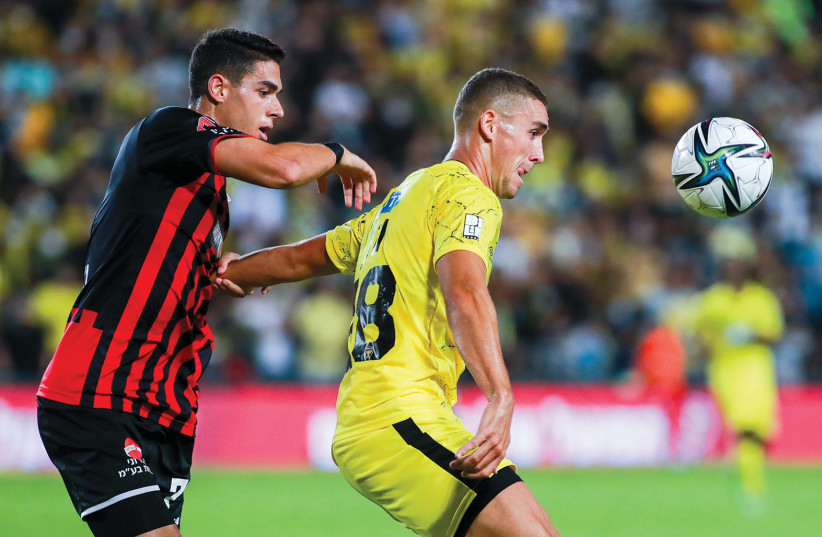There is a saying that when people think of the Holy City, two things pop into their minds – the Western Wall and the Beitar Jerusalem Football Club. However, over the past month Beitar has been the only thing on the tips of the tongues of soccer fans throughout the capital city.
From Mahaneh Yehuda to Ben-Yehuda Street and the various local cafés and restaurants, the locals have been enthralled with the precarious future of the yellow-and-black, which finally came to a head last week when Barak Abramov, the owner of the Japanika restaurant chain, purchased the club from embattled Beitar boss Moshe Hogeg.
Abramov’s on-again, off-again and then finally back-on-again purchase of Beitar ended a long saga that saw many highs and plenty of lows that had accompanied the club ever since Hogeg, a hi-tech entrepreneur, took over control, in August of 2018, from Eli Tabib.
Beitar Jerusalem, Moshe Hogeg and a racist fanbase with La Familia
“This is an exciting day for me,” Hogeg said when he took over ownership of the club. “I want to thank Eli Tabib, who took part in a short negotiation and left me a healthy and strong club. On paper I may be the owner, but I believe that a soccer club belongs to the fans and the city. It’s a huge honor for me to help take the club to new places. Soccer isn’t a business, and there is no goal for it to be profitable. I will invest what needs to be and what I can to take it to where it needs to be and turn Beitar into a strong and competitive team, just like it needs to be in Israeli soccer.”
High hopes came along with Hogeg’s purchase, as the new owner looked to immediately take on the racist elements emanating from Beitar Jerusalem fans, most prominently from the La Familia group, which has been against signing an Arab-Israeli or even a Muslim player. La Familia boycotted the club when Beitar had signed a pair of players from Chechnya almost a decade ago and walked out of Teddy Stadium en masse when one of them scored.
However, Hogeg decided to go head-to-head with these fans, and even said that he had bought the club due to its racist image and looked at the challenge of turning the negative impact into something larger than the game of soccer itself.
The decision was made to sign Nigerian midfielder Ali Mohamed, whose late father was Muslim and whose mother is a devout Christian. Mohamed, who had starred with Maccabi Netanya for three seasons, was the perfect signing on paper and furthered Hogeg’s vision, but in reality turned into a frustration for the supporters over the course of the two seasons with Beitar and was always a target of racist chants right from the get-go.
Beitar Jerusalem: A football club for the Israeli Right
Beitar Jerusalem, which was founded in 1936, has always been a club that has identified with the Israeli right wing and historically has been associated with the Likud Party. Former prime minister Benjamin Netanyahu, Yisrael Beiteinu Leader Avigdor Liberman and former president Reuven Rivlin are all ardent fans of the team.
Hogeg created a fan club and even had international soccer star Lionel Messi become a member, as they took photos together at a summit held in Spain.
With hopes for real change, Hogeg’s next step in his desire to eradicate the racism prevalent among the supporters was to bring in a partner who would shock the country to its core.
In December 2020, Hogeg formed a partnership with Sheikh Hamad bin Khalifa Al Nahyan from the United Arab Emirates. The sheikh, who is part of the royal family, acquired 50% ownership of the club after a long negotiation process and committed to invest more than NIS 300 million over the course of the next decade.
The news made headlines around the Holy Land and across the globe, as the move came on the heels of the Israel-UAE normalization agreement, which saw the borders of the UAE open to Israeli businesses, including the sports sector. Hogeg looked at the move as yet another step toward normalization, which would bring a new dawn on coexistence, brotherhood and community in Israeli sports.
The chairman of the Israel Football Association, Oren Hasson, praised the deal as well, as hope was flying high that a new day was about to dawn not only on Beitar Jerusalem but also on the domestic soccer scene as a whole.
Some in the Israeli sports industry looked at this move as being a bit odd. But with the chance that this partnership could bring peace to the Middle East in terms of Beitar Jerusalem, any risk was worth taking.
But in February of 2021, as backlash for the ownership deal was being felt by many sectors of the fan base, issues began to crop up about the partnership deal itself.
The Israel Football Association found problems surrounding the sheikh’s alleged wealth, and requested documents were unable to be produced, which set off further red lights concerning the 50-50 partnership. With too many questions and not enough clarity and answers, Beitar withdrew the request to approve the deal and said that once the proper paperwork would be in place, the request would be submitted once again. To this day, the request has not been resubmitted for approval.
As Hogeg was left to lick his wounds, with the Israeli soccer world and fans now looking at the Beitar owner with even further disdain, the next bombshell was dropped only months later.
Further embarrassment came when Hogeg needed to call off a friendly match against Barcelona, as he claimed it refused to play the game in Jerusalem. The Catalan club, however, said it had never officially announced that a contest would even take place.
Then, just as the 2021/22 season was about to kick off, Hogeg announced his intention to sell the club. But that wouldn’t be the only big announcement to be made.
Moshe Hogeg accused of sex crimes, crypto fraud
In November 2021, a well-known model accused Hogeg of sexually assaulting her as a 17-year-old, reported Channel 13, which was only the tip of the iceberg when, less than two weeks later, the Beitar owner was arrested on charges of alleged crypto fraud and sex crimes. In December, Hogeg was released to house arrest on NIS 70m. bail.
The club, which was now operating without an active owner, tried to finalize a sale with Stefan Melloul, a French-Jewish businessman, in January 2022. But after much publicity, his $1m. guarantee never arrived, and Beitar finished out last season by just surviving a tight relegation battle.
Beitar Jerusalem's murky future in search of an owner
AS THE summer months began, the future of Beitar was as murky as ever. Budgets needed approval by the Israel Football Association, and players needed to be signed, but that was unfortunately not even a consideration, with the team’s ownership status in serious limbo.
However, as it looked like the team might head to the second division, two potential owners were identified in Barak Abramov, who had been the owner of the Bnei Yehuda club as well as the Japanika restaurant chain, and Josh Jacoby, who had put together a group of Israeli and American investors.
It was clear from the beginning of the negotiations that Abramov was the preferred option, but a deal with the restaurateur fell apart at the 11th hour, as the club needed to get the appropriate approvals in order to remain in Israel’s top league.
With Abramov backing off, Hogeg held a last-ditch press conference on Tuesday afternoon, August 9, to try to get the two sides back to the negotiating table because a way needed to be found to bridge the gap between police guarantees, issues over the Bayit Vagan training facility, and a number of other financial considerations that had to be tied up.
With a deadline looming on Wednesday at noon, Hogeg, along with Abramov, Jacoby and Ashdod’s strongman Jacky Ben-Zaken, gathered at former Jerusalem mayor Nir Barkat’s home to hash out a deal to save Beitar from D-Day. However, Jacoby, who was reportedly willing to place some funds in the deal, backed off, which left the group needing to raise roughly NIS 2m. to finalize the deal.
Barkat was reportedly able to bring in the funds from a South African donor, the sides met, and the sale was consummated just in time for Abramov to take control of the club and now, hopefully, for all involved to take Beitar down a new road of success.
A deal approved: Beitar Jerusalem has been saved
The budget was approved, and the football association dotted the i’s and crossed the t’s to get the transfer of ownership through at the last moment in order for Beitar to open the season this weekend when it visits Maccabi Netanya.
While a sigh of relief has come over all those involved, from Abramov to the League and the fans, there is still plenty of work to do. But after four years of a whirlwind ownership under Hogeg, all are hoping that the next number of seasons will provide quiet and stability for the club, with as little drama as possible.
However, in Israeli soccer, and especially with Beitar, one always needs to expect the unexpected. ❖


